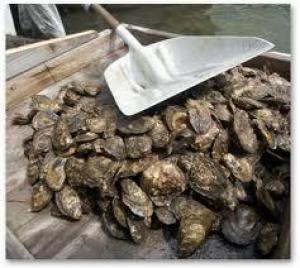Harbor House, owner charged in illegal harvests
Harbor House Seafood of Seaford was named in a 15-count indictment Aug. 16 charging the company with illegally harvesting and trafficking oysters valued at more than $600,000 and trying to cover up the crimes.
A U.S. federal grand jury in Camden, N.J., returned the indictment against Harbor House, co-owner Mark Bryan of New Market, Md., and employee Pamela Meloney of Secretary, Md. Also indicted were Reeves Brothers and its owners Thomas and Todd Reeves, and employee Renee Reeves, all of Port Norris, N.J. Oyster fisherman Kenneth W. Bailey of Heislerville, N.J., also was named in the indictment.
They are charged with creating false reports and records of harvested oysters, trafficking in illegally harvested oysters, obstruction of justice, and conspiracy.
According to a Department of Justice press release, from 2004 to 2007 the Reeves harvested more oysters from the Delaware Bay than allowed under New Jersey law, but they created required reports and records misstating their harvest.
The indictment states the Reeves harvested more than $600,000 illegally – in some years bringing in 90 percent more than their allowable oyster quota.
The indictment alleges that to help hide their illegal harvest, the Reeves and Mark Bryan and Pamela Meloney at Harbor House created and maintained false records of the amount of oysters the Reeves sold to Harbor House. To help prevent the discovery of their illegal harvest, Bryan and Meloney provided law enforcement officers with records of Harbor House's purchases from the Reeves that Bryan and Meloney know were false, officials stated.
The indictment states that Bryan and Meloney created false records of Harbor House's purchases from Port Norris-area oysterman, Bailey, who in turn created reports claiming he harvested fewer oysters from the Delaware Bay than he did.
The maximum penalty for five of the obstruction of justice counts is up to 20 years in prison and a $250,000 fine. Each of the remaining violations has a fine of $250,000 and up to five years in prison. The maximum penalty for the corporations is up to five years of probation and a fine in an amount that is the greater of $500,000 or twice the gross gain, for each count.
Ten vessels used in these illegal harvestings are subject to forfeiture to the United States if the parties are convicted of some of the charges, Justice Department officials stated. Pending the outcome of the trial, five vessels are prohibited from use or operation.
Melissa Steele is a staff writer covering the state Legislature, government and police. Her newspaper career spans more than 30 years and includes working for the Delaware State News, Burlington County Times, The News Journal, Dover Post and Milford Beacon before coming to the Cape Gazette in 2012. Her work has received numerous awards, most notably a Pulitzer Prize-adjudicated investigative piece, and a runner-up for the MDDC James S. Keat Freedom of Information Award.














































